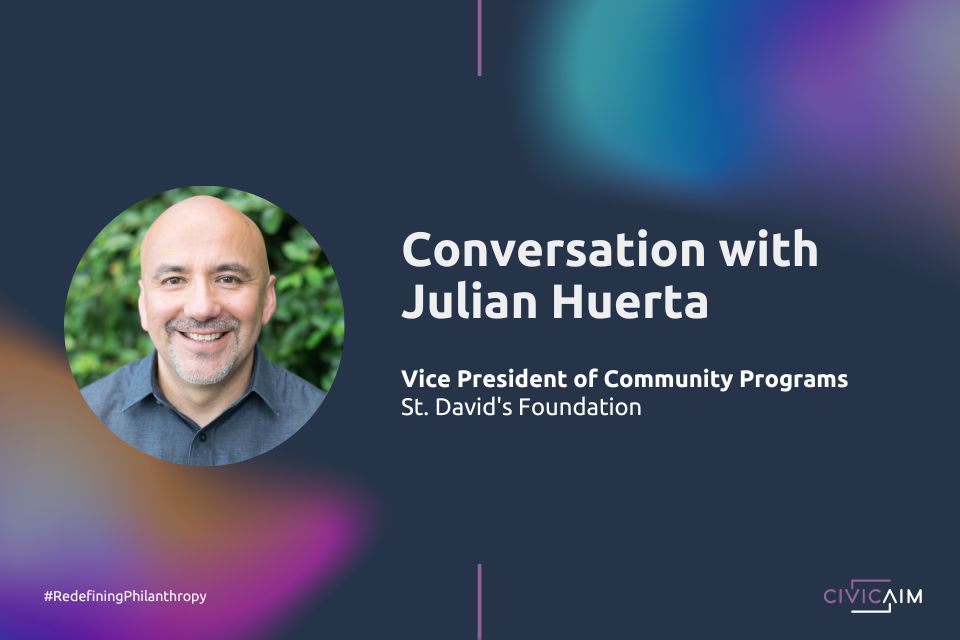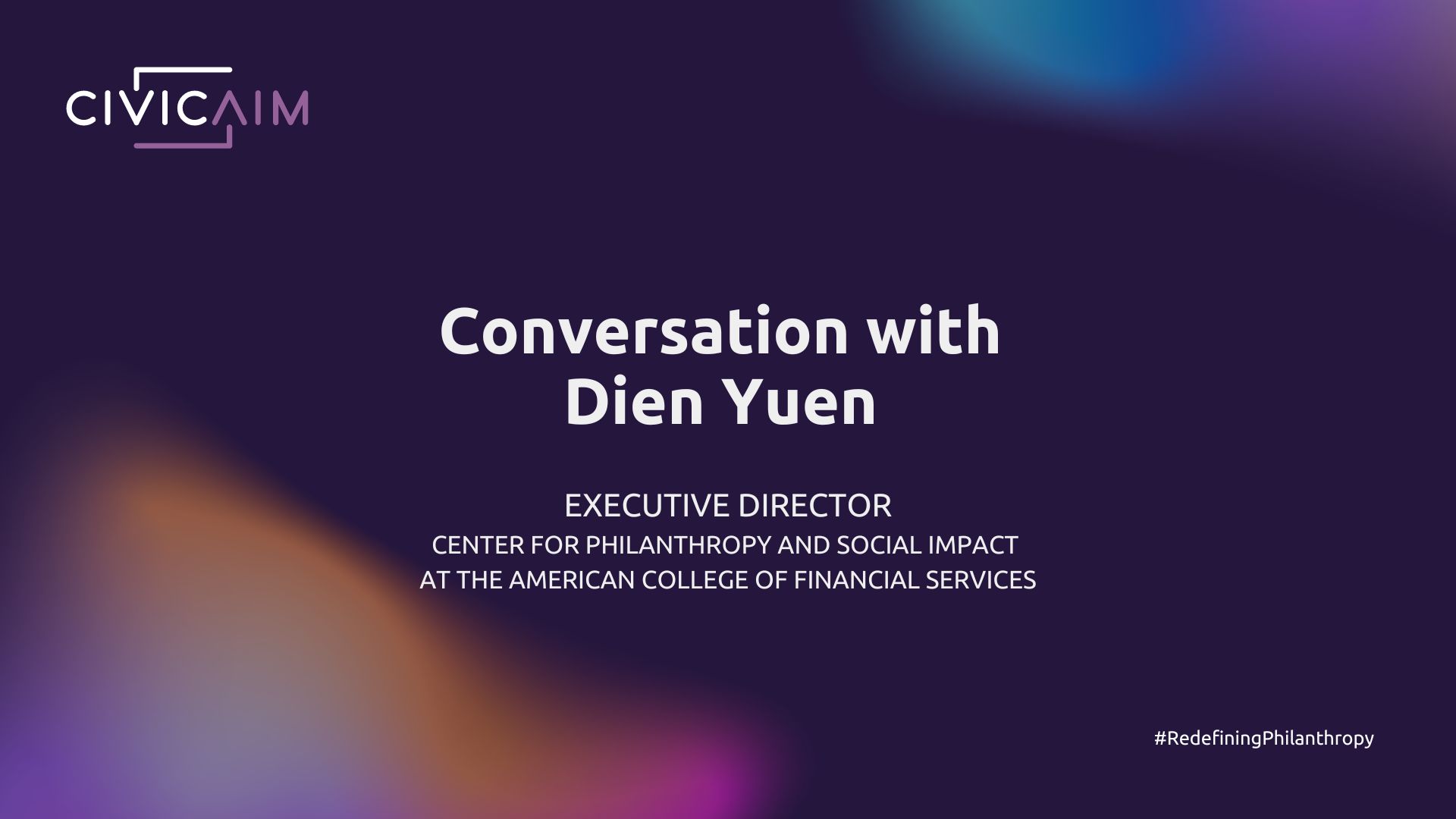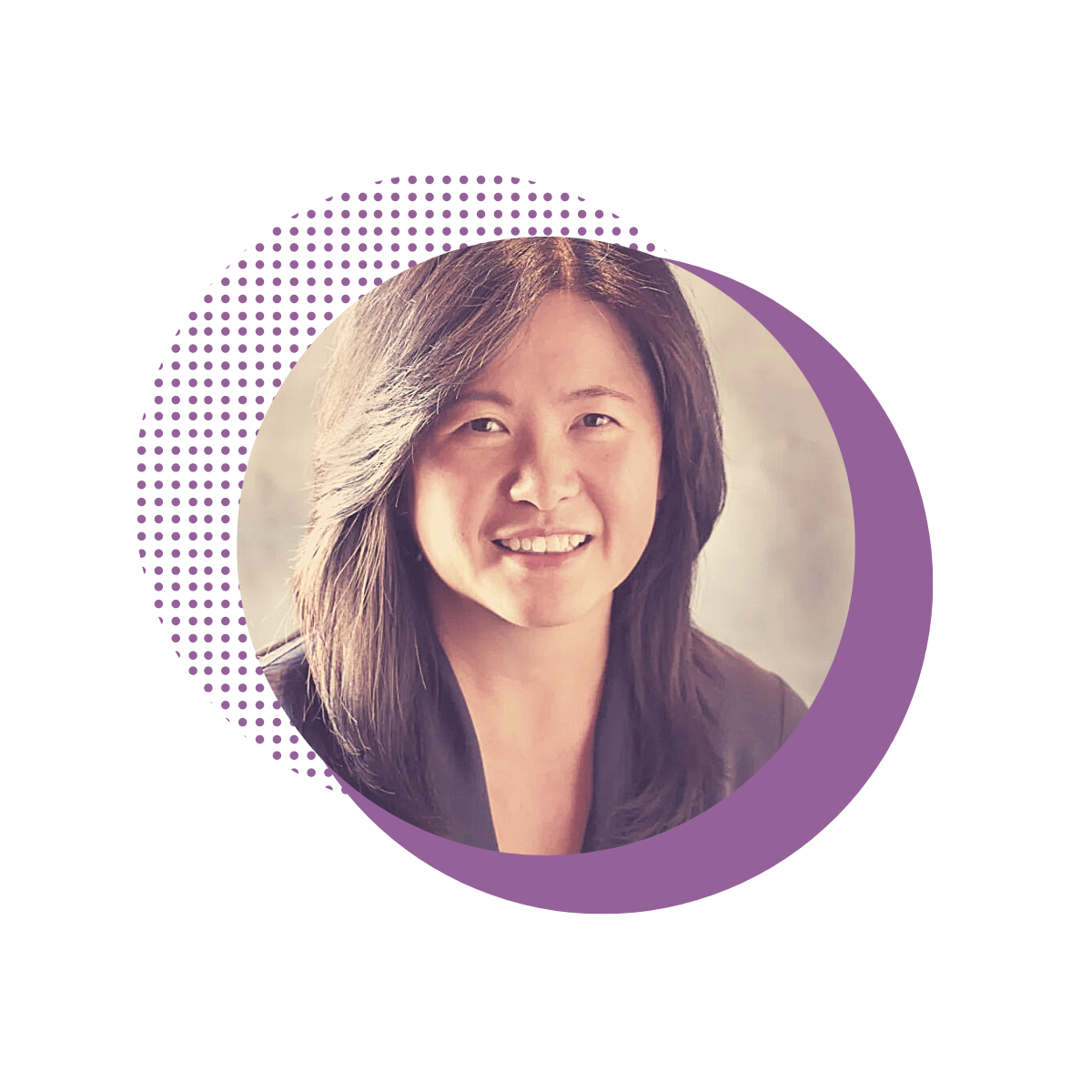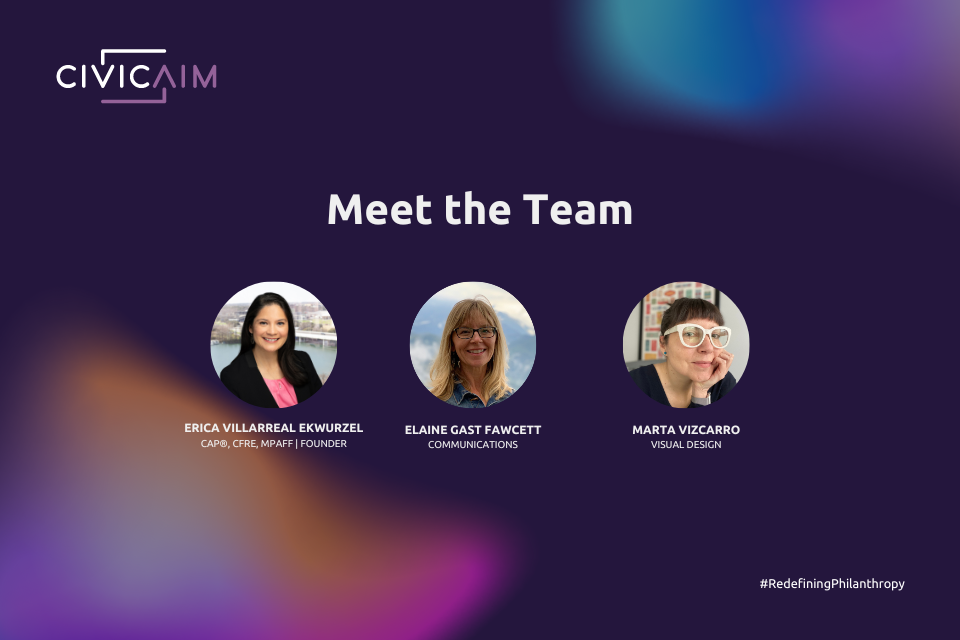
Redefining philanthropy: A Conversation with David Maurrasse
May 24, 2022
Redefining philanthropy: A Conversation with Julian Huerta
December 18, 2022

Philanthropy is both my passion and profession. As a sector, philanthropic advising is quite dynamic, and over the course of my career, I have aspired to stay informed, engaged, and continue learning. I recently graduated from the Chartered Advisor in Philanthropy® (CAP®) program through the American College of Financial Services—and I’m proud to say that I am a CAP® Impact Scholar, alongside a cohort of talented philanthropic advisors of color. Together, we broadened our understanding and acumen of financial tools and charitable strategies to achieve donor/client goals—and we did it as a network of BIPOC professionals strengthening the field.
As I celebrate my CAP® designation, I’m thrilled to feature one of my professors, Dien Yuen, JD/LLM, CAP®, AEP® and Executive Director, Center for Philanthropy and Social Impact, as my guest on Redefining Philanthropy in Practice and Profession—an interview series that features leaders who are at the forefront of centering equity in philanthropy.
What inspires me about Dien is her grasp of finance and strategy as a vehicle to advance philanthropic giving—and her leadership in advancing accessibility to diverse communities and practitioners who have not historically been involved in finance. Dien has actively recruited and engaged BIPOC professionals (including me!) to enroll in the CAP® curriculum and in recent years, incorporated a study group model, where CAP® candidates can learn and network together to connect. In addition to being a professor of the CAP® program, Dien was recently named Executive Director of the Center for Philanthropy & Social Impact, and program director of The Purpose School at the American College of Financial Services.
As I reflect back on my CAP® study experience, I am grateful for the dedicated space to delve deeper into philanthropic tools and strategies, cross-walk this knowledge with not only my lived experience as a professional, but with a cohort rich with a variety of roles and experiences, and take what we learned directly into our practice. The CAP® has widened my exposure to the complexity of financial vehicles (i.e. blended gifts, impact investing, variety of planned gifts, etc.), and has given me the financial vernacular for how financial gift planning can be accessible—and incredibly impactful—for all kinds of donors, both current, high-capacity donors, and those who wish to make a meaningful lifetime gift that transforms our world in a positive way. I am proud of what I have learned, gained, and given to the CAP® network, and I am most excited to continue its vibrancy in providing connections, knowledge and best practices in philanthropic giving.
Here’s an excerpt of my conversation with Dien. You can watch the full video here.
Erica: Dien, can you share a little more about how you got involved in the CAP® program, and what initially inspired you to lead the CAP® Impact Cohort programming?
Dien: I took the CAP® back in 2008, and it gave me a lot of credibility in my work, and helped me start my own consulting business and build relationships. I had an opportunity to come back and teach in the program, and today we have 2500 people who have CAP® designation, spanning the whole spectrum of the social sector. It’s become a go-to destination for philanthropy advisors.
A few years ago, we took a look at our participants, and realized of our then 2300 participants, barely 100 of them were advisors of color. We wondered: could we double that number in a year? We ended up doing it in seven months. Today, we’re seeing them transition into jobs, getting higher paying jobs, new positions, promotions, and being placed on boards. They are in positions of power and impact, even in this short time. I can’t wait to see what happens next.
Erica: I’m excited to be part of that pipeline. It goes to show: If you build it, we will come, and we will connect, and we will lift each other. That’s been my experience in the CAP® program, and I applaud your leadership and the school’s vision. What do you see in the field of finance and philanthropy today?
Dien: I wish I could say it’s more diverse, and that’s unfortunately not the case. According to a 2019 survey by the National Association of Charitable Gift Planners, about 480 people were asked about their racial identity. Only 32 of 480 identified as people of color. How does that make sense? Sometimes when I walk into these spaces, I’m still the only person of color in the room. As we grow the field of BIPOC advisors, I promise people: you’ll never be the only one in the room again.
Erica: What does redefining philanthropy mean to you?
Dien: To me, when we talk about redefining philanthropy, it’s about knowledge and access to education. If we don’t know the tools, we can’t use the tools. In our BIPOC communities, many of our donors and advisors haven’t been exposed to estate planning and giving tools, such as donor advised funds and charitable trusts—and that means, they can’t pass on wealth. The more we know, the more wealth is generated and put to good use. The more we know, the more we can give back to the community in strategic and tax-efficient ways. Let’s make sure all the people we talk with know about these tools.
Erica: Knowledge is power and it can be purposeful. I always come away feeling inspired and empowered in my role as a change agent and continuous learner, and I know your work will continue to redefine philanthropy.
Want to hear more? You can watch the full video here.
I hope you enjoy the episode. My hope is that the Redefining Philanthropy series is a forum that sparks ideas and inspires action—moving us all closer to a philanthropy that is truly equitable. When all voices are heard, everyone benefits—moving us all closer to a philanthropy that is truly equitable, representative, and impactful.

"Sometimes when I walk into [philanthropy and finance] spaces, I’m still the only person of color in the room. As we grow the field of BIPOC advisors, I promise people: you’ll never be the only one in the room again."
What We’re Reading
- Hali Lee, Urvashi Vaid, Ashindi Maxton. Philanthropy Always Sounds Like Someone Else: A Portrait of High Net Worth Donors of Color, Donors of Color Network
- Power Moves: A Guide to Grantmakers for Equity & Justice, Philamplify and National Center for Responsive Philanthropy
- Trust-Based Philanthropy Project
- Deciding Together: Shifting Power and Resources through Participatory Grantmaking, Grantcraft
What’s Your Philanthropic Aim?
CivicAIM is a philanthropy consulting firm focused on strengthening grantmaking, governance, and impact. CivicAIM supports mission-driven families, small-staffed foundations, funder collaboratives, and giving circles. Together with you, we develop and execute grant and evaluation strategies that lead you to impact, and we facilitate critical conversations and transitions that strengthen your board’s decision making.

